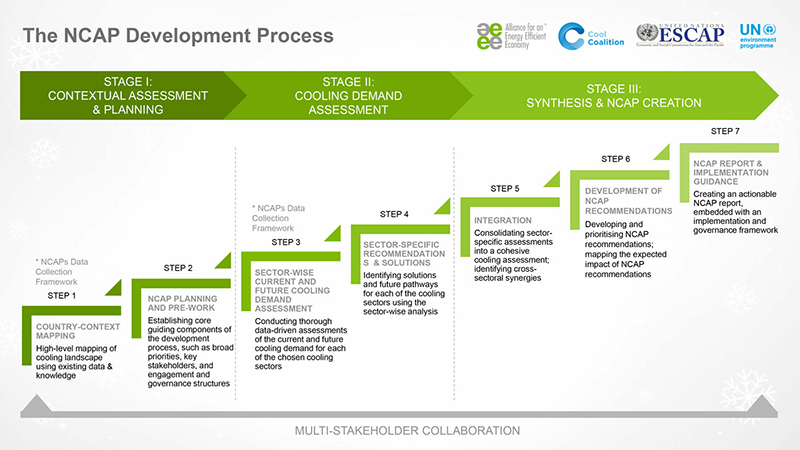New Delhi: Alliance for an Energy Efficient Economy (AEEE) is pleased to share the news of the e-launch of the NCAP Development Methodology at the Asia-Pacific regional capacity workshop. Dignitaries including Mr. Hongpeng Liu of United Nations Economic and Social Commission for Asia and the Pacific (UNESCAP), Ms. Dechen Tsering of United Nations Environment Programme (UNEP), Ms. Meg Seki of UNEP Secretariat and Mr. Jigmet Takpa of Govt. of India spoke about the importance and timeliness of NCAP Methodology development and commended Cool Coalition and all the partners involved. During the workshop, lessons learnt, including challenges, opportunities, solutions, and short-term regional priorities for implementation, were presented from the NCAP experiences of India, China, Cambodia, Vietnam, Sri Lanka, and Indonesia.
AEEE helped develop this global NCAP Development Methodology under the leadership of Cool Coalition, United Nations Environment Programme (UNEP) and United Nations Economic and Social Commission for Asia and the Pacific (UNESCAP), and with active support from Kigali Cooling Efficiency Program (K-CEP), Sustainable Energy for All (SE4ALL), United Nations Development Programme (UNDP), United for Efficiency (U4E), World Bank Group, Energy Foundation China, Collaborative Labelling and Appliance Standards Program (CLASP), University of Birmingham, and United Nations Industrial Development Organization (UNIDO). AEEE contributed to this holistic NCAP Development Methodology using its expertise and experience in co-developing the India Cooling Action Plan (ICAP), which is recogised for its depth, cross-sectoral nature, and multi-stakeholder engagement process. It serves as an essential tool to help national governments conduct a holistic assessment of their countries’ current and projected met and unmet cooling demand and develop NCAPs and draws upon shared experiences and working knowledge of developing NCAPs for different countries, including emerging economies and climate-vulnerable countries such as the Caribbean countries, Rwanda, Kenya, China, Vietnam, and Thailand.
“The NCAP Development Methodoloy is a critical milestone towards delivering efficient and sustainable cooling while also mitigating the climate crisis. NCAPs are a definitive way of driving change through a combination of policy, technology, and market interventions that address cooling across sectors, with the lowest possible energy and GHG emissions footprint.My sincere thanks and gratitude goes out to all National Cooling Action Plan working group partners and the Ministry of Environment, Forest and Climatre Change for presenting AEEE with the opportunity to work on the India Cooling Action Plan,” says Satish Kumar, President and Executive Director, AEEE.

The NCAP Methodology uses an integrative policy development framework and incorporates lessons learned from ICAP development. It has two distinct elements: an overarching NCAP Development Methodology that lays out the sequence of activities involved in NCAP development and Data Assessment Frameworks, which give an in-depth view into the data gathering and analysis of each cooling sector. The NCAP methodology covers cooling comprehensively, including all cooling sectors, i.e. space cooling in buildings, food cold-chain, healthcare cold-chain, mobile air-conditioning, and industrial process cooling. It also encourages countries to promote access to cooling, which is linked with the socio-economic progress of countries and meeting several Sustainable Development Goals such as (2) Zero Hunger, (3) Good Health and Well-being, (8) Decent Work and Economic Growth, and (10) Reducing Inequality. The NCAP Development Methodology is being successfully piloted in Cambodia and Indonesia under the aegis of Cool Coalition and with technical support from AEEE.
About AEEE
AEEE is one of the leading organisations in India, working on creating awareness about energy efficiency as a resource. It supports policy implementation and is an energy efficiency market enabler with a not-for-profit motive. We advocate for data-driven and evidence-based energy efficiency policies and research.
We foster a culture of energy efficiency in India, working with industry, government and civil society organisations. AEEE promotes thermal comfort for all, and a Lean-Mean-Green philosophy to design and construct net-zero energy-water-waste built environments, sustainable transportation and robust energy data framework for better policy-making and implementation, to build a culture of energy efficiency in India. We are committed to achieve India’s energy transition for a climate-resilient and energy secure future and meet India’s commitments to the 2030 nationally determined goals (NDC) and UN sustainable development goals (SDG).